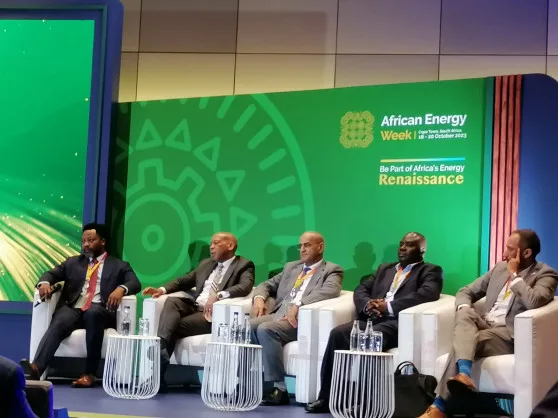
As Africa and Europe jointly spearhead the global green hydrogen economy, energy dynamics are undergoing a significant transformation. The abundant renewable energy potential in Africa, coupled with Europe’s ambitious production and import goals, is forging new energy pathways and redefining existing standards.
In line with this, African Energy Week 2023, the African Energy Chamber’s (AEC) premier energy event, featured a dedicated Hydrogen Summit under the theme ‘Powering the Future: Africa and Europe Unleashing the Green Hydrogen Revolution.’ The session, which was moderated by Ashutosh Singh, Director, Financial Services, S&P Global Commodity Insights, explored the far-reaching implications of this transformative shift.
The discussion opened with a keynote by Kgosientsho Ramakgopa, Minister in the Presidency responsible for Electricity, South Africa, underscoring the importance of green hydrogen in South Africa’s energy strategy.
“By 2040, Africa could produce 50 times more energy from renewables than the world’s estimated demand,” he said.
Speaking on South Africa’s ambitions, he added, “We are looking at $1 per kg by 2050, equivalent to indigenous low-cost energy, making South Africa one of the competitive industrial economies.”
The government has recognized green hydrogen as a key aspect of its just energy transition. It has implemented regulatory changes and introduced the Hydrogen Society Roadmap, serving as the industry’s comprehensive framework to facilitate large-scale investments.
“The intention of this kind of strategy is to ensure that we are able to develop the kind of standard required for green hydrogen in the future,” said Ramakgopa.
Meanwhile, in West Africa, Mauritania is spearheading large-scale projects, including the massive Aman project, the Nour Electrolyzer project and the Masdar-Infinity-Conjuncta green hydrogen project.
“We have big potential in renewable energy and green hydrogen is available,” explained Nani Chrougha, Minister of Petroleum, Mines, and Energy, Mauritania.
“We are working on the legal framework, which will help to see investments into these resources. We want to put the investors in a position that makes them comfortable investing,” he continued.
With green hydrogen in demand, Africa can benefit from cutting-edge research and technological advancements in hydrogen production, allowing the continent to harness green hydrogen’s potential more effectively and contribute to its energy transition and economic growth.
While there is a need for Africa to adopt technologies for green hydrogen and learn from the necessary experiences from European nations, Minister Ramakgopa stated, “We are not the recipients of technologies; we also have the capacity to develop it.”
The panel discussed the need for infrastructure required to support the green hydrogen supply chain in Africa, highlighting some challenges and opportunities in its development.
Minster Chrougha said, “We need to access financing to access our important resources, and this will be investment in infrastructure and in the mining sector, and we need to develop capacity in the mining sector, and these are two challenges.”
Developing a skilled workforce is essential for advancing the production and utilization of green hydrogen. “For African countries, it is very vital to build local capacity. This is a technology that we have not been working on in a long time, so it is extremely important that governments and institutions start to work on building capacity across the entire value chain,” said, Solomon Nwabueze Agbo, Scientist and Project Coordinator at Forschungszentrum Jülich GmbH.
Finally, to drive investment in green hydrogen, Africa can draw inspiration from Europe’s success stories. By implementing supportive policies and fostering international collaboration, the continent can attract the investments necessary for a thriving green hydrogen industry.
“For us to get to the point of $2 per kilo, we need to get everyone around the table, including off-takers and financiers,” stated Chinnan Maclean Dikwal, Vice Chair, Board of Directors, African Energy Council.
He added that for nations that haven’t had the resources for green hydrogen development, it necessitates strategic collaborations. Partnerships are likely to play a significant role.
#AEW2023 takes place this week in Cape Town under a mandate to make energy poverty history by 2030. Keep following www.aecweek.com for more exciting information and updates about Africa’s premier energy event.
Distributed by APO Group on behalf of African Energy Chamber.

